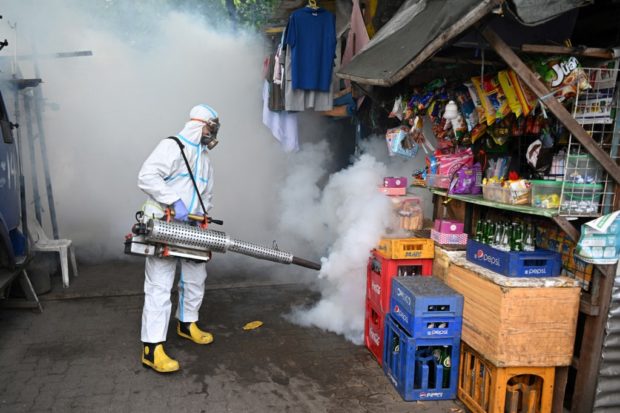
A city employee (L) disinfects houses at an informal settlers area in Manila on March 16, 2021, as the number of new daily cases of Covid-19 coronavirus has surged to the highest level in seven months. (Photo by Ted ALJIBE / AFP)
MANILA, Philippines — It is unlikely to see a downward trend in COVID-19 cases for the next two weeks despite the government task force’s decision to place Metro Manila and four adjacent provinces under a general community quarantine (GCQ) bubble, a fellow at the OCTA Research group said Tuesday.
In an interview over CNN Philippines, Dr. Guido David of the OCTA Research group explained that as of the moment, the reproduction number of COVID-19 in Metro Manila is at 2.1.
The reproduction number, also known as the R-naught or R0, is the transmission rate of a disease, where the number equals to how many people a patient can infect, where an R-naught of one means each patient can infect another potential patient.
“Right now the reproduction number in NCR is about 2.1 and if we want to reduce the number of cases, that means we have to reduce the reproduction number from 2 all the way down to 1,” he said.
“This cannot happen in two weeks, unfortunately,” he added.
On Sunday, Palace spokesman Harry Roque announced the Inter-Agency Task Force for the Management of Emerging infectious Diseases’ (IATF) decision to place Metro Manila, Bulacan, Rizal, Cavite and Laguna under a general community quarantine (GCQ) bubble, or the National Capital Region Plus (NCR +) bubble, from March 22 to April 4.
Under the two-week period, travel to and from Metro Manila and the four adjacent provinces is not allowed—unless deemed as essential.
With the restrictions imposed, the government hopes that this will curb the increase in COVID-19 cases by 25 percent.
‘Best case scenario’
But according to David, the “best case scenario” would be that the trends in COVID-19 cases may change in four weeks.
“Last time we had MECQ (modified enhanced community quarantine), it took us 28 days to reduce the reproduction number from about 1.7 to less than 1,” David said, citing the time MECQ was imposed in Metro Manila and other adjacent provinces in August 2020.
“That could be like a best case scenario, it could take us for about four weeks to start having a decrease in cases basing it on history,” he added
“I’m not saying it’s impossible but it seems very unlikely to happen to reverse in two weeks.”
David added that it would be a “big deal” if the reproduction number would go down by 1.5 in two weeks.
“That’s probably the closest to the most optimistic we could get. if we could get the reproduction number down to 1.5,” he said.
“If we can get it down to 1.5 to 1.6, that’s actually a big deal and I would be very happy to see that kind of reduction in reproduction number,” he added.

